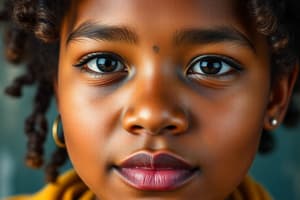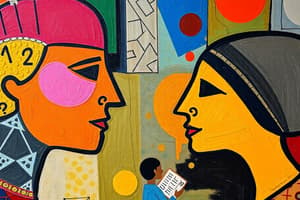Podcast
Questions and Answers
What is the primary focus of ethnics studies?
What is the primary focus of ethnics studies?
- Examining historical events
- Understanding race, ethnicity, and identity (correct)
- Studying economics and politics
- Promoting technological advancements
The 1965 Immigration Act restricted immigration primarily from non-European countries.
The 1965 Immigration Act restricted immigration primarily from non-European countries.
False (B), True (A)
What does BIPOC stand for?
What does BIPOC stand for?
Black, Indigenous, and People of Color
The case of Loving v. Virginia ended bans on _______ marriages.
The case of Loving v. Virginia ended bans on _______ marriages.
Which of the following defines 'social identity groups'?
Which of the following defines 'social identity groups'?
What does the 14th Amendment guarantee?
What does the 14th Amendment guarantee?
Eugenics is a study that promotes genetic superiority using scientific principles.
Eugenics is a study that promotes genetic superiority using scientific principles.
Tokenism refers to genuine diversity in a group.
Tokenism refers to genuine diversity in a group.
What is meant by 'privilege' in the context of social identity?
What is meant by 'privilege' in the context of social identity?
________ is the term used for someone seeking safety after leaving their country due to danger.
________ is the term used for someone seeking safety after leaving their country due to danger.
What are push factors?
What are push factors?
Match the following terms with their definitions:
Match the following terms with their definitions:
The ________ Act banned Chinese immigration.
The ________ Act banned Chinese immigration.
Match the terms with their definitions:
Match the terms with their definitions:
Explain the concept of 'intersectionality' in identity.
Explain the concept of 'intersectionality' in identity.
Which of the following represents a 'pull factor'?
Which of the following represents a 'pull factor'?
The term 'counter stereotype' refers to negative portrayals of individuals.
The term 'counter stereotype' refers to negative portrayals of individuals.
What distinguishes equity from equality?
What distinguishes equity from equality?
______ refers to racism built into society’s systems.
______ refers to racism built into society’s systems.
Which historical event involved the internment of Japanese Americans?
Which historical event involved the internment of Japanese Americans?
Flashcards
Immigrant
Immigrant
A person moving to a new country
Emigrant
Emigrant
A person leaving their country
Push/Pull Factors
Push/Pull Factors
Reasons people leave (push) or move to (pull) a place
1790 Naturalization Act
1790 Naturalization Act
Signup and view all the flashcards
14th Amendment
14th Amendment
Signup and view all the flashcards
Systemic Racism
Systemic Racism
Signup and view all the flashcards
Ideological Oppression
Ideological Oppression
Signup and view all the flashcards
Institutional Oppression
Institutional Oppression
Signup and view all the flashcards
Mass Incarceration
Mass Incarceration
Signup and view all the flashcards
Cultural Hegemony
Cultural Hegemony
Signup and view all the flashcards
Ethnic Studies
Ethnic Studies
Signup and view all the flashcards
1965 Immigration Act
1965 Immigration Act
Signup and view all the flashcards
Social Construct (Race)
Social Construct (Race)
Signup and view all the flashcards
Identity
Identity
Signup and view all the flashcards
Intersectionality
Intersectionality
Signup and view all the flashcards
Citizenship
Citizenship
Signup and view all the flashcards
Refugee
Refugee
Signup and view all the flashcards
Asylum Seeker
Asylum Seeker
Signup and view all the flashcards
BIPOC
BIPOC
Signup and view all the flashcards
Privilege
Privilege
Signup and view all the flashcards
Study Notes
Unit 1: Identity Formation
- Ethnic Studies: The study of race, ethnicity, and identity to understand inequality and promote social justice.
- 1965 Immigration Act: Changed U.S. immigration rules, allowing more non-European immigrants.
- 1790 Naturalization Act: Limited U.S. citizenship to "free white persons."
- Anti-Miscegenation Laws: Laws against interracial marriage.
- BIPOC: Short for Black, Indigenous, and People of Color.
- Citizenship: Legal status in a country, granting rights and responsibilities.
- Class: Social or economic group in society.
- Culture: Shared traditions, beliefs, and behaviors of a group.
- Dialogue Principles: Guidelines for respectful conversations.
- Ethnicity: Shared culture, language, or ancestry.
- Eugenics: A flawed ideology using "science" to promote racism.
- Externally/Internally Constructed Identity: How society defines you vs. how you see yourself.
- Hispanic/Latino: Terms with differing meanings based on context and heritage.
- Identity: The qualities that make someone unique.
- Intersectionality: How various aspects of identity (e.g., race, gender, class) overlap.
- Loving v. Virginia: Supreme Court case ending laws against interracial marriage.
- Minority: A smaller group with less power in society.
- Mixed Race: People with multiple racial backgrounds.
- Nationality: The country a person belongs to.
- Origins of Race: Race is a social construct, not biological.
- People of Color: General term for non-white racial groups.
- Positionality: Understanding how your identity affects your perspective.
- Preferred Nomenclature: Respectful terminology for discussing groups.
- Privilege: Unfair advantages based on identity.
- Race: A social construct based on physical traits.
- Race vs. Ethnicity: Race = physical traits; ethnicity = cultural heritage.
- Social Construct: An idea created by society, not biology.
- Social Identity Groups: Groups based on shared characteristics (e.g., race, gender).
- Third World Liberation Front: 1960s student group advocating for ethnic studies.
- Unearned Privilege: Advantages not based on effort, often associated with race.
- White Privilege: Benefits white individuals due to societal biases.
- Race: The Power of an Illusion: Documentary about race as a social construct.
Unit 2: Citizenship, Belonging, and Media
- Migration: Moving from one location to another.
- Migrant: Someone moving for opportunities.
- Refugee: Person forced to leave due to danger.
- Asylum Seeker: Person seeking safety in another country.
- Immigrant: Person moving to a new country.
- Emigrant: Person leaving their country.
- Push/Pull Factors: Reasons for moving away (push) or moving to (pull) a location.
- 1790 Naturalization Act: Limited citizenship to white people.
- 14th Amendment: U.S. citizenship extended to those born in the U.S.
- Chinese Exclusion Act: Banned Chinese immigration.
- Media: News, television, social media, and other forms of communication.
- Tokenism: Involving one person of color to promote perceived diversity.
- Implicit Bias: Unconscious stereotypes that affect judgments.
- Counter Stereotype: Positive image to challenge stereotypes.
- Danger of a Single Story: TED Talk emphasizing the limitations of single perspectives.
- Diversity in Media: Importance of representing diverse perspectives in media.
Unit 3: Systems of Oppression
- Four I's of Oppression:
- Ideological: Beliefs justifying inequality.
- Institutional: Discrimination embedded in systems.
- Interpersonal: Racism between individuals.
- Internalized: Believing stereotypes about oneself.
- Redlining: Discriminatory housing policies harming marginalized groups.
- Japanese Internment: Forced relocation of Japanese Americans during WWII.
- Mass Incarceration: High rates of imprisonment, largely affecting marginalized groups.
- Causes: War on Drugs, "three-strikes" laws.
- Impacts: Family disruption, community damage.
- Connections: Parallels with the treatment of Japanese Americans.
- Cultural Hegemony: Dominance of one culture over others.
- Equity vs. Equality: Fairness vs. treating everyone the same.
- Racism: Prejudice + power.
- Systemic Racism: Racism ingrained in societal systems.
- Conscious Hip Hop: Music that addresses social injustice.
Studying That Suits You
Use AI to generate personalized quizzes and flashcards to suit your learning preferences.
Description
Explore the key concepts of identity formation through the lens of ethnic studies. This quiz covers significant historical laws, terms, and ideologies that shape our understanding of race, ethnicity, and social justice. Test your knowledge on the implications of citizenship, culture, and identity in society.



